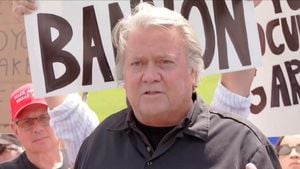Disputes over the Bogotá Metro Project are heating up as President Gustavo Petro and Mayor Carlos Fernando Galán openly clash over the progress and efficacy of the city’s long-anticipated infrastructure initiative. Despite the project boasting 48% completion, contention remains between national and district authorities, igniting debates on the best strategies for addressing urban mobility.
The latest round of this public disagreement began during the inauguration of new Transportation Minister María Fernanda Rojas, where Petro reiterated his opposition to the elevated section of the metro. He articulated concerns, stating, "the elevated metro does not serve Bogotá," implying it fails to alleviate the city’s transportation challenges. He warned of worsened urban conditions along the project's route, claiming the situation might intensify existing traffic woes.
Responding to Petro's criticisms, Mayor Galán asserted, "The metro not serving Bogotá is the one which failed to exist for over 80 years," emphasizing the significant changes the project brings. He highlighted studies indicating enhancements to travel times, claiming commuters could see travel durations shrink from two hours to just 27 minutes. This assertion draws support from the findings presented by various engineering societies, contradicting Petro's assertions.
Further, Galán defended the environmental impact of the metro project, emphasizing it's more than just constructing rail lines; it’s about urban regeneration. A report from the World Bank and University of Los Andes indicates the metro line has positively affected property values within 800 meters of its path since 2016. Galán insisted, "The line’s effect on land value is real and beneficial, contrary to the president's claims of urban degradation. We need to focus on collaboration rather than confrontation; the public is tired of the continuous fighting.”
The political discord reflects broader concerns about Bogotá's future. Petro has suggested the city is suffering from infrastructural neglect, asserting, "Bogotá has begun to die,” alluding to systematic issues plaguing the urban environment, including transportation inefficiencies and accessibility challenges faced by citizens. Similarly, he rejected the USD 7 billion investment on the grounds it wouldn't meaningfully solve transport problems and could instead fuel increased reliance on personal vehicles.
Addressing these concerns at public forums, both Petro and Galán have heatedly exchanged views, underlining contrasting perspectives not just on the metro but on urban planning philosophies. The projects initiated by the current Bogota administration are being watched closely, as Galán noted several concurrent development initiatives aim to bolster the city’s infrastructure and services, citing the San Cristóbal cable car project set to improve connectivity.
Petro's critics have suggested the president's remarks stem from political motives rather than genuine concern over urban impact. Many citizens hope the metro project signifies progress after decades of stagnation. For years, Bogotanos have awaited substantial transport solutions to counter the city's notorious traffic, which many liken to endless gridlock.
This feud over urban infrastructure may also symbolize the broader sociopolitical climate within Colombia, where urban development persists as one of the most contentious issues between local and national authorities. Galán's reiteration of the metro's potential benefits aims to shift public sentiment, positioning the metro as part of the urban solution as opposed to the problem. He remarked, “It’s time to stop fighting; let’s work together for the sake of our city’s future.”
Both leaders have significant stakes at play, with Petro elected on promises to reform transportation, but now facing public scrutiny for his stance against the very solution meant to drive change. This fractured dynamic within the government has left many wondering who will emerge victorious from the dispute, and whether the metro, once finished, will fulfill its promises or become another point of contention.
Currently, as discussions continue and the project inches toward completion, residents of Bogotá watch with piqued interest—a glimmer of hope for improved commuting awaits. Yet, with political tensions high, the resolution of these disputes may be as important as the track itself, shaping the future of urban transport for tens of thousands who rely on it daily.



